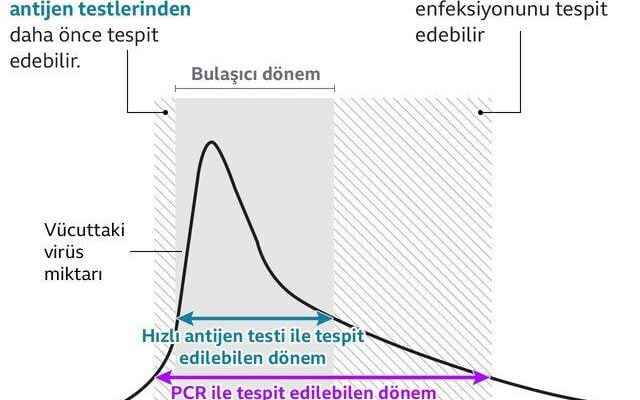Rapid antigen tests, which were made widely available in the UK with a budget of 4.7 billion pounds, changed the course of the pandemic. It is thought that the tests will continue to be used after the pandemic.
In the UK, a plan to widely implement rapid antigen tests has been implemented, with a plan called Operation Moonshot by the government.
The plan aims to avoid the constraints of daily life with the use of millions of inexpensive, disposable rapid antigen tests that can produce results in 15 minutes rather than the more sensitive PCR tests that have to be sent to a laboratory.
However, from the beginning of the plan, discussions about the accuracy of the tests continued.
When rapid tests were introduced twice a week in middle schools in the spring of 2021, there were concerns that large numbers of students would be falsely told they had tested positive and sent home. Some scientists argued that the tests could “make more worse than better” the school schedule, and leaked emails claimed the plan could be withdrawn.
But recent data shows that many of these concerns are unfounded. Since March, the rapid antigen test performed by 183,939 students in England has been positive, and then PCR test was performed to confirm the result. A total of 89 percent of these tests gave the same positive result.
As the prevalence of the disease in the population decreases, the rate of false positives should increase. But the weekly rate of these positive rapid antigen tests, which was later confirmed by PCR testing, never fell below 50 percent. The accuracy rate has hovered above 84 percent since schools opened in the UK in September.
Alexander Edwards, Associate Professor of Biomedical Technology at the University of Reading, says that when tests are used as directed, “it quickly became clear that we don’t tend to get lots of false positives.”
Free delivery to homes
Rapid antigen testing has become a part of everyday life in the UK. In the first place, the tests were made available in health services, workplaces and sports events. In April, the program was opened to the public. Boxes of seven tests can now be delivered to homes free of charge or purchased from pharmacies.
Another potential disadvantage of batch tests at this scale is the possibility that people will trust this result more than necessary if it comes back negative.
Professor of Biostatistics at Cambridge University Medical Research Council (MRC). Sheila Bird says, “This is definitely not a free-from-jail-free pass. You have to continue to take precautions like wearing a mask and social distancing.”
“Testing helps weed out only some of the true positive cases.”
A study in Liverpool showed that antigen tests can detect only half of asymptomatic people who test positive for PCR on the same day.
However, these PCR tests may have retrieved old genetic material from the virus that remained in the body even after the infection period.
prof. Petersen says rapid antigen tests are much better at detecting the cases most at risk of contracting Covid.
prof. A peer-reviewed paper co-authored by Peterson found that rapid antigen tests were 80 percent effective at detecting any level of active Covid infection, and were even better at catching the most contagious individuals.
It is also still unclear how well the rapid antigen tests perform against Omicron. Experiments showed that the main brands used in the UK successfully detected all 15 samples infected with the new variant. But the results of a small study published last week using different antigen tests used in the US have raised new concerns. Accordingly, some Omicron cases can continue to be transmitted for several days before being detected by rapid tests.
Scientists say the lesson is to remember that when rapid antigen testing is done just before socializing, a negative test result does not completely rule out the possibility of Covid infection. However, test results can be used as a reliable guide.

Was it worth the £4.7bn budget?
Health authorities have budgeted £4.7bn for batch testing in the UK this year, with much of it going to testing suppliers in China. Whether all that money is worth it is something epidemiologists have debated for many years. Separating the effects of the rapid test from wearing a mask to quarantine and different Covid measures is an extremely difficult and open to interpretation issue.
Early results from a pilot study in Liverpool found that the early start of rapid testing in the city was linked to a 32 percent drop in hospital admissions due to Covid, easing the pressure on hospitals.
Parts of this initial pilot became government policy. For example, some people may use daily rapid tests as an alternative to quarantine.
Some scientists want the plan to go even further and use rapid antigen tests instead of expensive PCR lab tests for both those who show COVID symptoms and those who don’t.
Professor at UCL University in London. “The PCR program is a complete waste of resources. It was used only because we had no other choice. Sooner or later it must be phased out,” says Irene Petersen.
Others think it’s time to end the mass-testing program completely as the Omicron rolls around.
Education secretary Nadim Zahawi told the BBC he has no plans to charge people for rapid antigen tests.
Zahawi also noted that an additional 425 million tests will be submitted this month, with more shipments expected after that.
Allyson Pollock, Professor of Public Health at Newcastle University, says the tests should be used as part of a clinical diagnosis or targeted at people who work with vulnerable groups in places like nursing homes and hospitals.
“The cost of mass testing was staggering. The best advice is if you have symptoms, stay home until you get better, and that way you avoid spreading Covid, the flu, and a host of other viral infections,” says Pollock.
“All testing hurts. Testing can give false assurance on the one hand, and cause false alarms and unnecessary quarantine on the other.”
Are the tests permanent?
Scientists think that batch tests could be used to detect different diseases in the near future. A new generation of rapid antigen tests designed to detect not only Covid but also different forms of flu and other viruses are entering production.
Some scientists think we may soon have a series of rapid antigen tests, or “viral thermometers,” stashed in the medicine cabinet to help diagnose the disease much more quickly.
prof. “For example, we have drugs that can reduce flu severity, but they have to be taken right after infection. You can have a system where a fragile person can get tested and take their medication right away. It would be great to see such a positive outcome from this very negative pandemic,” says Alex Edwards.
